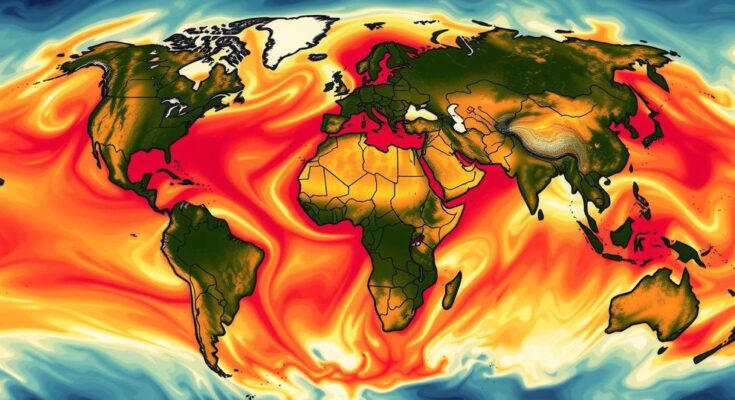2024 is confirmed as the hottest year globally since 1850, with an average temperature of 15.1 degrees Celsius, exceeding the critical 1.5-degree Celsius threshold. This historic warmth highlights the urgent need for global climate action, as it reflects severe implications of human-induced climate change alongside natural factors such as El Nino.
The year 2024 has been officially recognized as the hottest year on record globally since the commencement of temperature documentation in 1850. This alarming trend underscores the pressing need for substantial global measures to combat climate change, as reported by the EU-supported Copernicus Climate Change Service (C3S). Notably, 2024 is the inaugural year in which the average global temperature has surpassed 1.5 degrees Celsius relative to pre-industrial levels, a critical target outlined in the Paris Agreement.
The global average temperature for 2024 was documented at 15.1 degrees Celsius, surpassing the previous record set in 2023 by 0.12 degrees Celsius. Furthermore, this temperature records a rise of approximately 1.6 degrees Celsius above the pre-industrial estimates. The two-year average for 2023 and 2024 has also crossed the 1.5-degree Celsius benchmark, emphasizing the urgency of immediate climate action. The Paris Agreement aims to restrict global warming to well below two degrees Celsius, with an ambition to keep it below 1.5 degrees Celsius by the century’s end.
C3S cautioned that while the 1.5-degree threshold has yet to be permanently exceeded, indicated by the need for a sustained average over 20 years, the increasing temperature trends are unprecedented in human history. In 2024, there was also a record increase of approximately 5 percent in atmospheric water vapor compared to the 1991-2020 average. This situation, combined with heatwaves and intense rainfall, has significantly impacted millions worldwide.
Samantha Burgess, strategic lead for climate at the European Center for Medium-Range Weather Forecasts (ECMWF), highlighted the severe implications of these climatic changes. In discussions with Xinhua, C3S climate scientist Julien Nicolas attributed the extreme temperatures largely to anthropogenic climate change, while also noting the role of the El Nino Southern Oscillation in these weather patterns. C3S Director Carlo Buontempo emphasized the critical importance of prompt and effective action to influence the future trajectory of the planet’s climate.
The Copernicus Climate Change Service (C3S), funded by the European Union, provides essential data on climate trends and impacts, serving as a vital resource for understanding global climate dynamics. The records indicate a pronounced warming not only in individual years but as an escalating trend that holds severe implications for climate policies worldwide. With the Paris Agreement setting ambitious goals for climate stabilization, the exceeding of critical temperature thresholds underscores the current climate crisis, necessitating urgent action from governments and organizations globally to mitigate adverse effects.
In summary, 2024 has been confirmed as the warmest year on record, demonstrating a significant rise in global temperatures. This serves as a clear indicator of the escalating climate crisis and reinforces the need for decisive global action to meet the objectives of the Paris Agreement. As noted by climate experts, it is imperative that immediate measures are implemented to avert further detrimental changes to the planet’s climate system.
Original Source: www.socialnews.xyz




